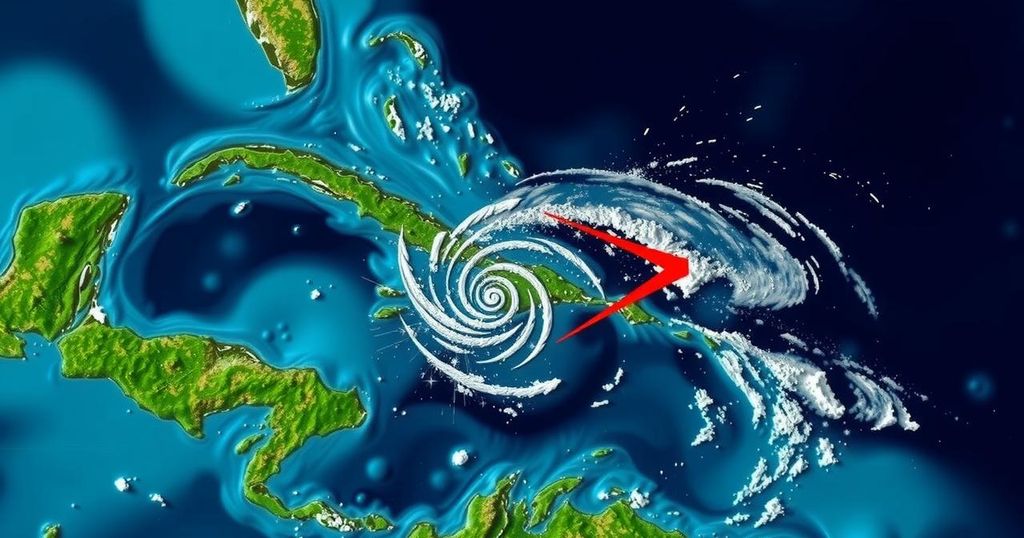Tropical Storm Oscar Advances Toward the Bahamas Following Impact in Cuba
Tropical Storm Oscar is moving toward the Bahamas after impacting Cuba as a Category 1 hurricane, resulting in at least six fatalities and heavy rainfall. The storm, noted for being the smallest recorded hurricane, dropped significant rainfall in eastern Cuba and is expected to continue affecting the Bahamas. The Atlantic hurricane season predicts several named storms and hurricanes amid rising ocean temperatures, with Tropical Storm Kristy also active in the Pacific Ocean.
Tropical Storm Oscar is presently advancing toward the Bahamas following its recent landfall in Cuba as a Category 1 hurricane. The storm has regrettably claimed the lives of at least six individuals and has caused extensive rainfall on an island that is also grappling with a significant power outage. As of Tuesday morning, Oscar was located approximately 45 miles (75 kilometers) south-southeast of Long Island in the Bahamas, exhibiting sustained winds of 40 mph (65 kph) and progressing in a north-northeast direction at a velocity of 12 mph (19 kph), as reported by the National Hurricane Center in Miami. The center further noted, “Oscar is at best barely a tropical storm at this time.” Forecasters expect Oscar to deposit as much as 5 inches (13 centimeters) of rain throughout the southeastern Bahamas, with isolated regions potentially receiving up to 8 inches (20 centimeters). A tropical storm warning has been issued for the central and southeastern Bahamas. Notably, Oscar has noted a historical significance as the smallest recorded hurricane, possessing a wind field measuring merely 6 miles (10 kilometers) across. Oscar’s landfall in Grand Inagua Island, Bahamas on Saturday, followed by a secondary landfall in eastern Cuba late Sunday, caught many meteorologists off-guard. Michael Lowry, a hurricane specialist and expert on storm surge, provided an analysis stating, “It’s not often we see a colossal failure in hurricane forecasting,” noting that no predictive models had foreseen Oscar strengthening into hurricane status. The storm unleashed at least 15 inches (38 centimeters) of rain in certain regions of eastern Cuba on Monday, prompting warnings of severe flooding and potential landslides. The six reported fatalities occurred in Guantánamo. Compounding the situation, the storm struck as Cuba continues to recover from a massive blackout that had previously incited small protests, coupled with government warnings that threatened punitive measures for any civil unrest. Oscar is identified as the 15th named storm and the 10th hurricane of the ongoing Atlantic hurricane season, which spans from June 1 to November 30. The National Oceanic and Atmospheric Administration has projected an above-average Atlantic hurricane season this year due to record-high ocean temperatures, anticipating between 17 to 25 named storms and four to seven major hurricanes of Category 3 or higher before the season concludes. Additionally, Tropical Storm Kristy is stirring over open waters in the Pacific Ocean, located 375 miles (605 kilometers) west-southwest of Acapulco, Mexico, with maximum sustained winds measuring 50 mph (85 kph) and a west-northwest trajectory of 15 mph (24 kph). Kristy is forecasted to reach hurricane status by Tuesday night.
The Atlantic hurricane season runs from June 1 to November 30, during which numerous storms can develop into hurricanes, driven by factors such as warm ocean waters. This year, there has been a notable increase in the frequency and intensity of storms, driven by elevated ocean temperatures, prompting predictions of an above-average storm season. The National Oceanic and Atmospheric Administration (NOAA) has alluded to this possibility, forecasting numerous named storms and major hurricanes for the season. Understanding hurricane behavior and forecasting remains critical, especially in the context of tragic events such as those caused by Tropical Storm Oscar, which has caused significant human and infrastructural distress in the affected regions.
In conclusion, Tropical Storm Oscar has emerged as a significant weather event, having transitioned from an unexpected hurricane to a lesser tropical storm impacting the Bahamas after causing devastation in Cuba. Its historical importance as the smallest recorded hurricane, alongside the dire consequences of flooding and fatalities, underscores the unpredictability and dangerous nature of such weather phenomena. As the hurricane season continues, vigilance and preparedness remain paramount for the communities at risk.
Original Source: www.usnews.com




Post Comment